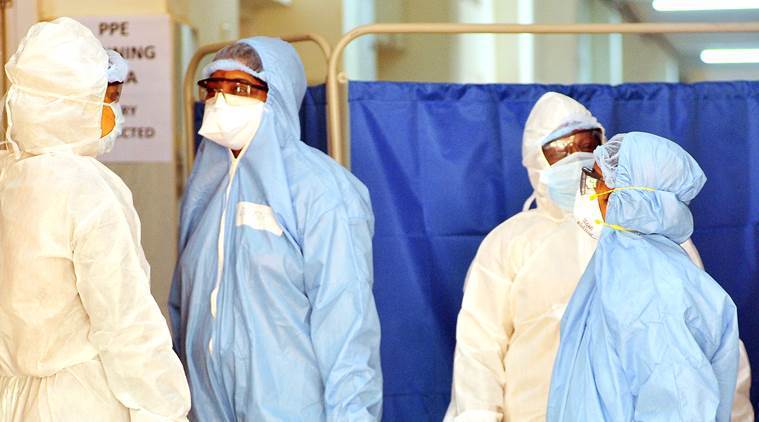 Ten years after Pune saw the pandemic H1N1, experts at Naidu hospital say there is a higher level of coordination between multiple agencies to prevent the spread of coronavirus.(File Photo)
Ten years after Pune saw the pandemic H1N1, experts at Naidu hospital say there is a higher level of coordination between multiple agencies to prevent the spread of coronavirus.(File Photo)
At Naidu hospital in Pune, the conservancy staff is on alert and stops anyone without a mask from entering. Their alertness is imperative as over 50 suspected patients of novel coronavirus (COVID 2019) are admitted in isolation wards in this civic hospital.
“Foreign country se aaye ho kya (have you come from a foreign country),” the attendant asks while some couples wearing masks look around uncertainly at the Pune Municipal Corporation-run hospital, which has earmarked 90 beds for persons with symptoms of COVID-19.
So far, 55 people have been admitted in the isolation wards and authorities are awaiting reports on at least 44 of them from the National Institute of Virology (NIV). Nine persons have tested positive in Pune so far.
The hospital staff has been sensitised and trained on how to interact with people and handle queries.
At the hospital lobby, a three-member doctor and attendants’ team, wearing masks, listens attentively to queries from people. A woman who returned from Singapore 10 days ago, but has no symptoms, has been directed by her company to get tested at the hospital.
Meanwhile, two youngsters in their late 20s walk up to the front desk and say they have come from Goa and both of them have a cough. They want to know if they should get tested for COVID 2019.
Explained: How home quarantine works
One of the doctors, on condition of anonymity, told The Indian Express that the staff has prepared a questionnaire for travellers from affected countries. The checklist includes questions about their travel history, whether they have a history of contact with any ill person in that country, whether their co-worker was ill, and if they have visited any health facility. It also includes questions about their travel details within India. The form has questions on which symptoms — cough, cold, fever, sore throat, backache, headache and breathlessness — they had on arrival, if any. The attendants then direct them to the concerned doctors, pooled from the PMC, state government and even Sassoon hospital, at the respective outpatient departments, where they undergo check-ups.
If they are asymptomatic, these people have to fill up a form, where they agree to a self-quarantine at their own homes, and follow the instructions given by doctors on infection prevention.
Medical Superintendent Dr Sudhir Patsute is engaged in training nurses and some of the doctors on how to handle both suspected and positive COVID 2019 patients. The masks are on and so is the protective clothing.
Explained: Here is how scientists are finding a cure for coronavirus
Dr Patsute dismisses complaints about food and water not being available at the hospital. He says the hospital has “simple” isolation wards and sufficient care is being taken to teach housekeeping staff how to talk to pateints. Ten years after Pune saw the pandemic H1N1, experts at Naidu hospital say there is a higher level of coordination between multiple agencies to prevent the spread of coronavirus.
“Our nurses and doctors are trained in how to offer counselling services… the housekeeping and conservancy staff is directed on how to speak with patients,” said a doctor.
However, doctors also admit that there is a level of anxiety due to easily available information about the fast spread of the virus across countries.